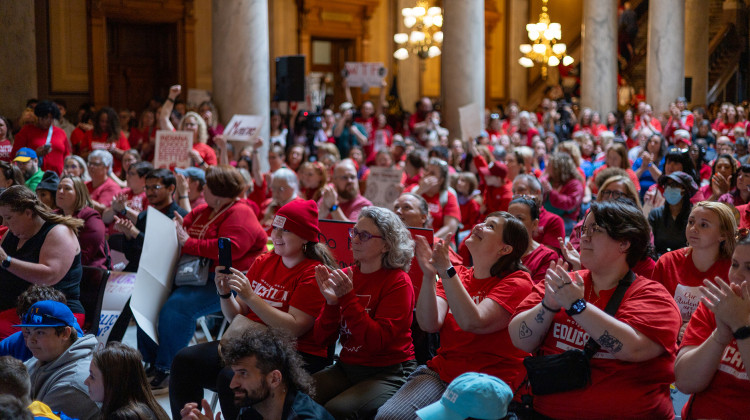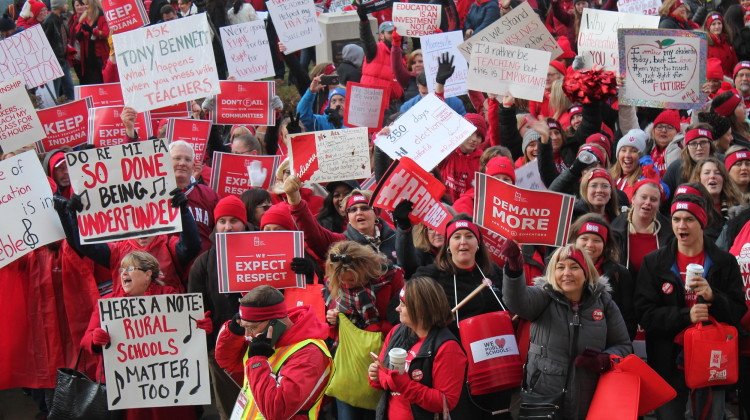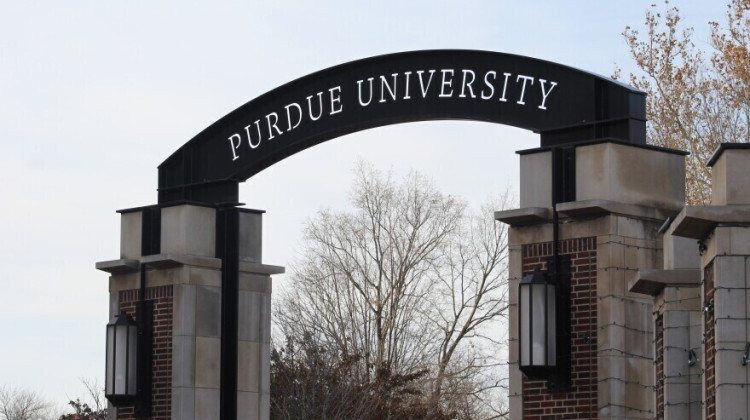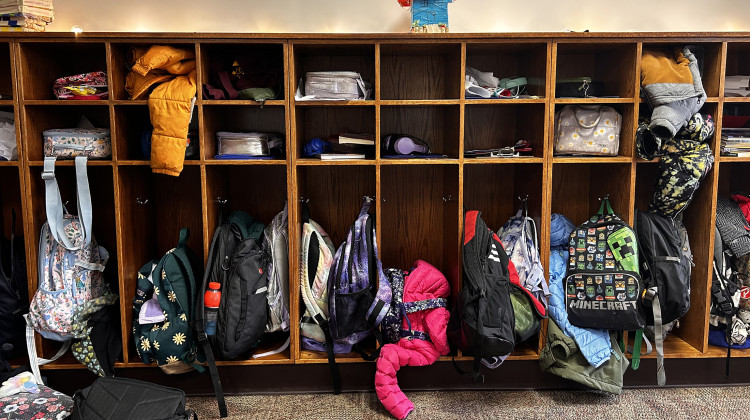
Hundreds of educators and their supporters filled parts of the multiple floors in the building for Indiana State Teachers Association’s Day of Action on Monday, April 14, 2025.
Zach Bundy / WFYIIndiana Gov. Mike Braun signed a property tax relief plan Tuesday, a move fiercely challenged by school districts who worry about losing property tax revenue to reforms and charter schools.
Braun approved the legislation just hours after it was passed by the Senate.
Senate Bill 1 was amended throughout the legislative session, each time altering how much property tax revenue would go to traditional public schools.
The bill provides homeowners a tax credit on their homestead property tax bills beginning in 2026 with stackable credits for veterans with disabilities and seniors, among other measures.
The changes are projected to erase $744.4 million in property tax funds for local districts over the next three years, based on what schools would receive under the current law.
The legislation passed with a 27-22 vote, mostly along party lines. Gov. Mike Braun said he “looks forward” to signing into law despite previously criticizing the package for homeowners.
“This is historic property tax relief,” Braun said in a Tuesday statement. “Senate Bill 1 cuts property taxes for most Hoosier homeowners, farmers, and businesses, limits future tax hikes, and makes the tax system fairer, more transparent, and easier to understand.”
Halfway through session, House Republicans added language from a separate proposal—Senate Bill 518 that would require local property tax revenue to be shared between traditional public school districts and charter schools starting in 2028.
The sharing of operations fund revenue, which covers transportation, utilities and capital projects, would be phased in over four years. The measure impacts about 30 school districts.
Charter schools are expected to receive about $4.7 million in the first year. Democratic lawmakers called out the lack of fiscal projections beyond that.
School districts where more than 100 students – or 2% of the district’s spring average daily enrollment count — attend an eligible charter school would be required to share revenue.
Education leaders spoke out against the plan, voicing concern about a drop off in revenue under the Republican-led property tax plan.
Republican Sen. Travis Holdman, who carried the property tax relief plan through session, said schools won’t “lose money” merely not receive as much as they are used to from current law.
“They will not receive as much money as they would have under current law,” Holdman said in discussions late Monday night. “The large majority of schools and municipal governments and counties would receive more in [20]26 than they did in [20]25, more in [20]27 and more in [20]28.”
In February after unveiling his plan for property tax relief, Braun said school districts and local governments need to run more efficiently.
“Almost all of them are saying that they can't do without what they're having now, I would say, prove it,” Braun said then. “Prove it that you didn’t salt away a lot, that you didn’t overburden the taxpayer by maybe making investments in buildings that weren’t needed or other things that weren’t essential.”
The legislation includes other education related provisions, including the required sharing of district's voter approved property tax referendums with charter schools.
It also dissolves the Union School Corporation in Randolph County. Few reasons were give by lawmakers as to why they used legislation to close a district without public input.
'Powerful win' for charter schools
As traditional school districts decry the passed bill, charter school advocates The Mind Trust called the legislation “historic”. The Indianapolis-based nonprofit advocates for and financially supports charter school expansion in the city.
“For far too long, charter school students have faced an unacceptable funding disparity,” The Mind Trust wrote in a statement. “This legislation changes that by ensuring all public school students benefit from property taxes, and it does so in a responsible way by phasing the policy in over time to give school districts and charter schools an opportunity to plan for the shift.”
Charter schools are tuition-free public schools managed privately by nonprofit boards instead of elected officials. These boards operate under contracts granted by one of several state-approved authorizers.
In a statement on social media, the newly-created Indiana Charter Innovation Center said Senate Bill 1 is more than policy. The center advocates for charter schools across the state.
“It’s a powerful win for the 56,000+ students who attend public charter schools across our state,” they wrote.
Indianapolis Public Schools have repeatedly told lawmakers and their community that the tax plan – combined with property tax sharing to dozens of charter schools – would cause the district to shutter more than 20 schools.
The Legislative Services Agency predicts IPS could lose nearly $14 million from 2026 to 2028. District officials say they will lose $96 million by 2032 as funds are divide with charter schools.
Sen. Andrea Hunley (D-Indianapolis) – a former IPS principal – said she wants families to choose where they send their children to school but warned of consequences of taking from one system to give to another system.
“We want to make sure that all of our public schools are fully funded, but taking money from one of our systems that's underfunded and giving it to another system that's underfunded isn't the way to do it, and it's never going to be,” Hunley said. “We have the ability to fully fund education. I hope that we'll do it without pitting one community against another.”
Rachel Fradette is the WFYI Statehouse education reporter. Contact Rachel at rfradette@wfyi.org.
 DONATE
DONATE






 Support WFYI. We can't do it without you.
Support WFYI. We can't do it without you.